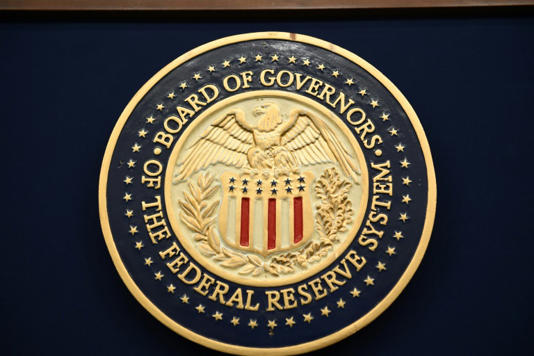
-
Published: 02 May 2023

Expectations to raise interest rates in the United States, despite signs of a slowing economy
Edited by Tony Wild
economy section
May 2, 2023
The Federal Reserve is expected to raise interest rates for the 10th - and possibly last - time on Wednesday, as it continues its battle against soaring inflation.
The US central bank is likely to make this decision, despite increasing signs of a slowdown in the US economy, as many economists expect the US to enter a mild recession later this year.
Analysts expect the Fed to raise interest rates by 25 basis points and then keep them high in an effort to bring inflation back towards the long-term target of 2%, without triggering a deeper recession than expected.
Bank of America economists wrote in a note to clients Friday, “We expect the Federal Reserve to raise (interest rates) by 25 basis points next week, to be followed by a pause in June, with a weak tendency for a subsequent rate hike.” ".
Wednesday's rate hike would mark the tenth consecutive increase, bringing the index to between 5 and 5.25 percent - the highest level since 2007.
The meeting of the Federal Open Market Committee (FOMC), which sets interest rates on May 2nd and 3rd, will take place under very different circumstances from its predecessors in March when the meeting took place amid a brief and severe banking crisis that culminated in the rapid collapse of the Silicon Valley bank. a few days earlier.
The rapid collapse of the Silicon Valley bank, affected by the excessive interest rate, raised fears of banking contagion which were exacerbated by the collapse of Signature Bank in New York a few days later.
In the face of this continued turmoil in the banking sector, the Fed ditched the massive hike in interest rates on March 22nd, opting instead to raise them by a quarter point.
Concerted efforts by US and European regulators after the Silicon Valley collapse helped calm financial markets and appear to have prevented further damage to the banking sector.
"With stress easing in credit markets, Fed officials appear poised to move forward with a 25 basis point rate hike at a meeting in early May," Michael Pearce, chief US economist at Oxford Economics, wrote in a recent note to clients.
But although the financial markets became calmer, the collapse of the Silicon Valley bank had a lasting effect on the banking sector, as banks tightened their lending conditions in the weeks that followed.
In this context, Fed officials indicated that tighter lending terms could act as an additional increase in the interest rate, which could reduce the number of increases needed to bring inflation down to 2 percent.
Fed Governor Christopher Waller said in mid-April, "A significant tightening of credit conditions could obviate the need for further tightening."
But he cautioned against "making such a judgment" before good data is published on the impact of financial turmoil and bank lending.
For their part, US regulators admitted Friday that they could have done more to prevent the collapse of both "Silicon Valley" and "Signature Bank", while the Federal Reserve called for stricter banking rules in the future.
Recent US economic data points to a slowing economy, with expectations mounting that the US will enter a recession later this year.
Data released in late April showed that economic output slowed to an annual rate of 1.1 percent in the first quarter of this year, while the measure of inflation fell to an annual rate of 4.2 percent in March, from 5. 1 percent in the previous month.
The growing impact of the Fed's rate hike campaign on the economy has led analysts to expect the Federal Reserve to stop raising interest rates after Wednesday's decision.
With interest rates expected to be raised by a quarter point, the focus will instead be on "any changes in the guidance language that the statement will carry" from the Fed, economists at Deutsche Bank wrote in a recent note to clients.
And they said in the note, "While our main issue remains that the increase in May will be the last in this cycle because the economy responds to restrictions (on lending), we see risks in the tendency to increase again in June."
For his part, Federal Reserve Chairman Jerome Powell said after the decision to raise interest rates in March, that the Fed could raise interest rates again before ending the current rate hike cycle.
His comments supported the FOMC's medium outlook for interest rates for 2023.
The committee's March meeting minutes said the Fed was expecting the US to enter a mild recession later this year when it decided to raise interest rates.
The extent of the recession may depend on the Fed's decision on how far to raise interest rates, Kenneth Kim, chief economist at KPMG, wrote in a recent note to clients.
"Any further interest rate increases beyond (those in) May risk a deeper recession than the moderate deflation we currently expect," he said.
{source}<script async src="https://pagead2.googlesyndication.com/pagead/js/adsbygoogle.js?client=ca-pub-4474625449481215"
crossorigin="anonymous"></script>
<!-- moss test ad -->
<ins class="adsbygoogle"
style="display:block"
data-ad-client="ca-pub-4474625449481215"
data-ad-slot="6499882985"
data-ad-format="auto"
data-full-width-responsive="true"></ins>
<script>
(adsbygoogle = window.adsbygoogle || []).push({});
</script>{/source}
